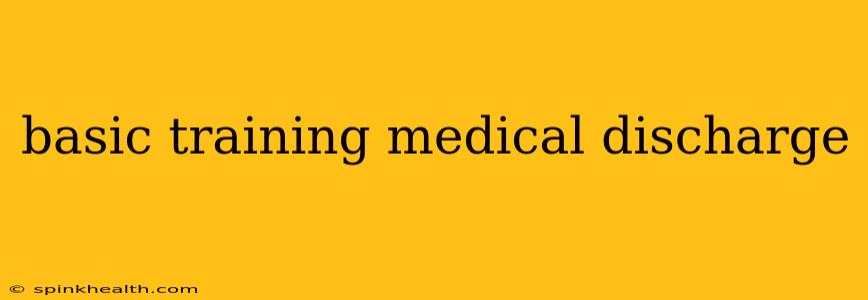The bright lights of basic training, the crisp uniforms, the unwavering discipline – it's a rite of passage for many aspiring service members. But sometimes, unforeseen circumstances intervene. A medical issue arising during basic training can lead to a medical discharge, a process that can be both confusing and emotionally challenging. This article unravels the complexities of basic training medical discharges, offering clarity and guidance to those who find themselves navigating this difficult terrain.
My name is Alex, and I spent years working as a military discharge specialist, helping countless individuals understand their rights and navigate the often-complicated bureaucratic processes surrounding medical discharges. I've seen firsthand the stress and uncertainty involved, and it's my hope that this article provides some much-needed peace of mind.
What Constitutes a Medical Discharge from Basic Training?
A medical discharge from basic training happens when a recruit's medical condition prevents them from fulfilling the physical and mental demands of military service. This isn't a simple "I have a headache" scenario. It requires a documented medical condition, confirmed by military medical professionals, that significantly impacts the recruit's ability to perform their duties. Conditions can range from pre-existing issues that were not detected during the initial medical screening to new injuries or illnesses developed during training.
What types of medical conditions might lead to a discharge?
This is a broad question, and the specifics depend greatly on the nature and severity of the condition. However, common examples include:
- Significant musculoskeletal injuries: Broken bones, severe sprains, or chronic conditions like arthritis that severely limit mobility.
- Mental health issues: Conditions like anxiety, depression, or PTSD that significantly impair a recruit's ability to function within the military environment.
- Chronic illnesses: Conditions like asthma, diabetes, or heart conditions that may not be immediately life-threatening but could pose significant risks during strenuous activities.
- Vision or hearing impairments: Conditions that prevent a recruit from meeting the minimum standards for visual acuity or auditory function.
How is a Medical Discharge Processed?
The process typically begins with a medical evaluation by military doctors. If the medical personnel determine the condition renders the recruit unfit for duty, they will recommend a medical discharge. This recommendation then goes through a chain of command for review and approval. The entire process can take several weeks, or even months, depending on the complexity of the case and the specific branch of service.
What are my rights during a medical discharge process?
You have several key rights during this process:
- Right to a second opinion: You can request a second opinion from an independent medical professional, though this is generally subject to military regulations.
- Right to legal representation: You can consult with a lawyer specializing in military law to understand your options and ensure your rights are protected.
- Right to appeal: If you disagree with the decision, you may have the right to appeal the discharge, although the success rate of appeals can vary. Understanding the specifics of appeal procedures is crucial.
What happens after a medical discharge?
After a medical discharge, you'll receive documentation outlining the reasons for the discharge. This documentation is crucial for future employment, educational opportunities, and potential VA benefits. Depending on the length of your service and the nature of your condition, you might be eligible for certain benefits, such as healthcare through the Department of Veterans Affairs (VA).
What benefits might I be eligible for after a medical discharge from basic training?
Eligibility for benefits depends on several factors, including the length of your service, the nature of your medical condition, and your specific circumstances. It’s crucial to contact the VA directly to discuss potential benefits.
Can I re-enlist after a medical discharge?
Re-enlistment after a medical discharge is possible in some cases, but it depends entirely on the nature of the condition and whether it has been resolved or managed effectively. The military will assess your medical fitness before considering re-enlistment.
Basic training medical discharges are complex situations. Understanding your rights, the process, and your potential options is vital for navigating this challenging time. Seek advice from military legal professionals, veteran support organizations, and the appropriate military medical authorities to ensure you are fully informed and properly supported throughout the process. Remember, you are not alone.

